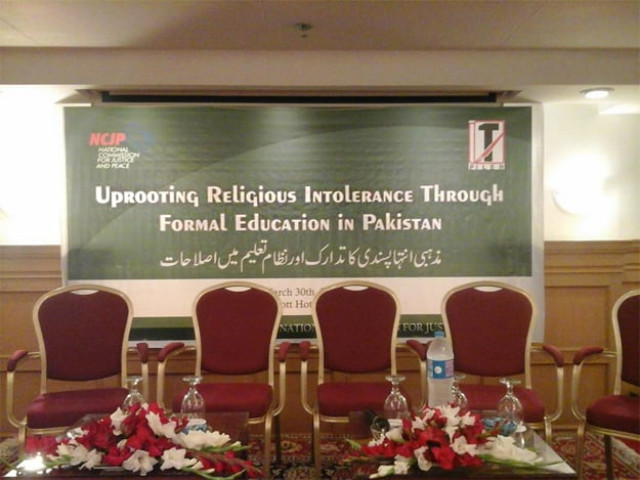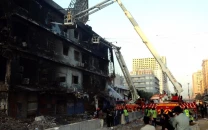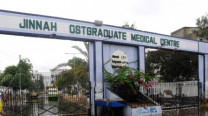Distorted history: Researchers share only 25% of findings for fear of their lives
Hate material continues to plague textbooks, finds group studying 70 public school textbooks

Hate material continues to plague textbooks, finds group studying 70 public school textbooks. PHOTO: FACEBOOK
"If we had put in all the samples of hate material found in public school textbooks, we would have been killed," said Kashif Aslam, an official of the National Commission for Justice and Peace (NCJP).
NCJP, along with Pakistan Institute of Labour Education and Research (Piler), organised a seminar titled 'Uprooting Religious Intolerance through Formal Education' at the Marriott hotel on Wednesday. Aslam said in their latest study of 2015-2016, NCHP analysed 70 textbooks, including those of Urdu, Islamiat and optional subjects, such as ethics, from all four provinces.

The study reveals the presence of hate material in the form of distortion of history, material promoting gender bias, extremism and violence, and hate speech. The study has highlighted the controversial material with the name of the book, lesson, and page number. "In our textbooks, Hindus are our enemies and are only from India, while Christians are portrayed as agents and promoters of West," said Aslam.
Giving examples, he said textbooks have also distorted the Crucifixion of Jesus Christ. Similarly, when textbooks narrate the Partition, they only give a picture of Pakistan's side, and exclude details of atrocities committed on the other side.
"We have found that 100 lines of hate speech which were present five years ago in a book are still present. Things have been included in the textbook but the hate material has not been excluded," he explained.
Silver lining
However, in Punjab and Sindh, there have been some positive changes brought on by the provincial governments.
In Punjab, following the National Action Plan, the government, in a bid to promote tolerance, distributed small booklets with stories of a Hindu, Muslim and Christian speaking of religious tolerance; and another on equality of men and women.
In textbooks, the government has also added two-three lines of heroes of other faiths, and lines about festivals of religions other than Islam.
In Sindh, the August 11, 1947 speech of Mohammad Ali Jinnah [promoting rights of minorities] has been included, though as a small reference and not a chapter. Information about education activist Malala Yousafzai, Benazir Bhutto, and Zulfikar Ali Bhutto have also been added in textbooks.
However, in Khyber-Pakhtunkhwa (K-P) and Balochistan, there has been no progress. In K-P, during the previous provincial government's tenure, positive changes were made into the textbooks which were unfortunately reversed by the present government. "A political ally of the ruling party in K-P had reservations why 'good morning' was written instead of 'salaam', and why information about other religious festivals was provided," said Aslam.
Balochistan's textbooks are the same as those used in Punjab, with the material being the same but books having different covers, he informed.
Speaking on extremism, Piler executive director Karamat Ali said Jamaatud Dawa chief Hafiz Saeed is and international terrorist but slogans in his favour are pasted everywhere in Badin and Tharparkar.
Professor Charles Amjad Ali from the US said Pakistan was created for minorities of India, and is a minority state, adding that Pakistan was a state in the making, and any state incapable of protecting and providing rights to its people is not a state in the proper sense.
Pakistan Tehreek-e-Insaf MPA Syed Hafeezudin said the fabric of society was destroyed by General (retd) Ziaul Haq and other politicians who used religion for political gains.
He pointed out that in his constituency, there is a madrassa which provides accommodation to 10,000 students. "This cannot be matched by any public or private educational institution, which is why the poor are exploited to go towards religious seminaries for schooling their children," he said.
Published in The Express Tribune, March 31st, 2016.



















COMMENTS
Comments are moderated and generally will be posted if they are on-topic and not abusive.
For more information, please see our Comments FAQ